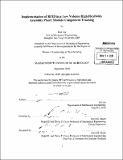Implementation of RFID in a low volume high flexibility assembly plant : module component tracking
Author(s)
Jia, Rui, S.M. Massachusetts Institute of Technology
DownloadFull printable version (10.08Mb)
Alternative title
Implementation of Radio-Frequency Identification in a low volume high flexibility assembly plant : module component tracking
Other Contributors
Massachusetts Institute of Technology. Dept. of Mechanical Engineering.
Advisor
David E. Hardt.
Terms of use
Metadata
Show full item recordAbstract
The purpose of this thesis is to help Varian Semiconductor Equipment Associates, Inc. (VSEA) to smooth the production and reduce the manufacturing cost. Without an efficient way to track on its high-value components, VSEA thereby spends hundreds of thousands of dollars to respond to customers' fraudulent claims and adds extra burdens to manufacturing teams. RFID system is introduced to improve the traceability of high-value components. By physically applying a RFID tag on a component and associating the tag with necessary information of the component, VSEA is able to avoid accepting a fraudulent claim by providing reliable and accurate record for a particular component. After testing different types of RFID tags and various checking system setups, the RFID system is verified feasible to be implemented in the high-value component tracking. Specially, a guideline of tag placements on different components is generated for reference in further implementation.
Description
Thesis (M. Eng.)--Massachusetts Institute of Technology, Dept. of Mechanical Engineering, 2010. Cataloged from PDF version of thesis. Includes bibliographical references (p. 86-89).
Date issued
2010Department
Massachusetts Institute of Technology. Department of Mechanical EngineeringPublisher
Massachusetts Institute of Technology
Keywords
Mechanical Engineering.